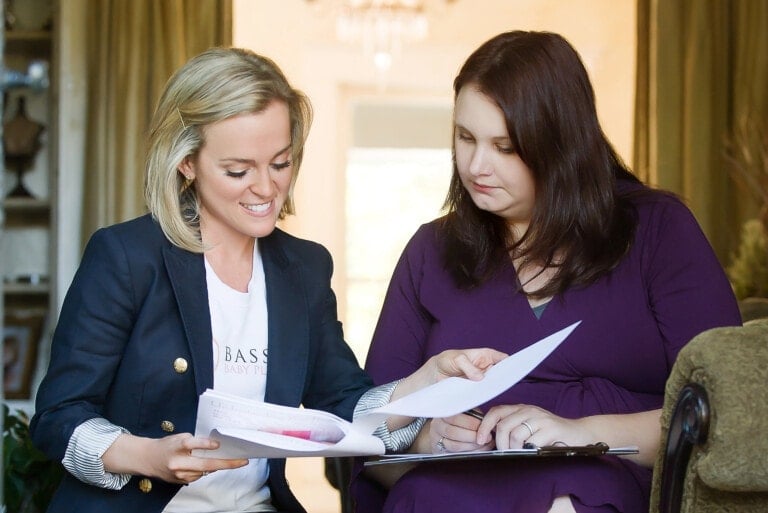Despite believing pregnancy would be blissful, you have felt ongoing worry, anxiety, stress, depression, and sadness. You reach out to family, friends, or colleagues for help, support, and advice, only to be told:
- It’s all in your head. Just get over it. Suck it up.
- It’ll go away.
- All pregnant women have emotional ups and downs. It’s normal.
You turn the conversation in a different direction, but inside, you feel discounted, unsupported, and more worried than ever.
What should you do?
What to Do When Your Family Doesn’t Understand Your Pregnancy Depression or Anxiety
1. Understand that they don’t have good information.
Most unhelpful comments that pregnant women receive in response to sharing their emotional distress or pregnancy depression and anxiety are based on myths. These long-standing untruths have been around for years, so they seem to become the truth. Myths such as “Everybody feels that way” become oversimplified, pat answers.
Most people, including clinicians, don’t understand pregnancy depression and anxiety. They don’t know that they exist. They don’t know that they are the most common problems pregnant women face. Many women feel guilty and ashamed and don’t share their feelings. So, the experience of pregnancy depression and anxiety remains hidden.
Recognizing that your friend or family member’s comment comes from incorrect information may help you take a different perspective. In most cases, they’re not trying to be hurtful. They don’t know current facts and evidence.
2. Help educate your family, friends, and co-workers about pregnancy depression and anxiety.
It’s only been over the past 5 to 9 years that we have heard more about pregnancy depression and anxiety. But, for the most part, it is still only known to perinatal psychiatrists and researchers.1 Additionally, pregnancy depression and anxiety are rarely detected during prenatal care, which speaks to the lack of awareness among women, their families, and their healthcare providers.
You may need to educate your friends, family, and co-workers. You can do this effectively and gently using these prompts as suggestions. You’ll notice that each includes sharing your experience PLUS providing information wrapped up in your experience. And each prompt is designed to end on information that the person is likely to pick up and want to explore further:
- At my appointment, I shared with my doctor how I was feeling, and she helped me realize that I was struggling with some anxiety. I didn’t even know that pregnant women could feel this way!
- My doctor just diagnosed me with depression. I had no idea how common it was in pregnancy.
3. Recognize that people are uncomfortable.
Pregnant women don’t share their emotional struggles because it makes them feel vulnerable and uncomfortable. It’s helpful to recognize that a similar discomfort often drives people’s reactions and responses. Most people don’t know what to say when someone shares that they have anxiety or depression. You can help yourself and others by packaging your story in a way that alleviates your discomfort – and theirs – and leads to a natural opportunity for them to support you. Here are some suggestions:
- I want to tell you something that’s difficult for me to share and makes me feel vulnerable. I’ve just been diagnosed with depression.
- I want to tell you about something that’s been really tough for me. My doctor just diagnosed me with anxiety.
4. Recognize their response to your pregnancy depression is not about you.
Sometimes, people respond with ignorance, defensiveness, and judgment no matter what you say and how you say it. Although the comments are hurtful, it’s important to take a step back from them and recognize that they are not about you. They’re about them.
If you know that your friends or family members are likely to respond with judgment, you need to decide how much benefit there is in sharing your situation.
If you didn’t anticipate their hurtful responses, you must move into owning your emotional health.
5. Take ownership and responsibility for your emotional health.
Advising you to take responsibility seems like a crazy solution when another has hurt you, but owning your emotional health involves taking charge of your emotions. Your friend or family member must take responsibility for what they said (out of your control!).
It would be best if you took responsibility for how you receive it – whether you:
- Allow the comments to destroy you emotionally.
- React by striking out verbally, saying something you’ll regret.
- Continue to think about the comment, becoming angrier and more hurt over time.
No growth happens, and no benefit results from not owning your emotional health. There are only two options:
- You own your emotional health. Take responsibility for your thoughts and emotions because when you own them, you can change them. Intentionally choose to exercise grace (excusing the person’s lack of knowledge) and forgiveness (excusing the injustice done to you). Choose to move beyond the situation, considering how (although difficult) you might grow and become stronger through the adversity.
- You don’t own your emotional health. When you aren’t intentional about managing your thoughts and emotions, you begin playing the conversation repeatedly in your mind. This makes you feel more insecure, threatened, and abandoned.
Mama, you’ve got this, and you’re not alone. Get support from loving family members, trusting friends, and compassionate professionals if you’re struggling with pregnancy depression and anxiety.































